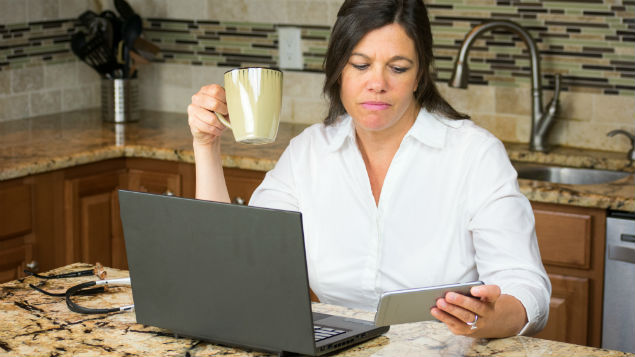[ad_1]

Shutterstock
The explosion of remote working during the UK’s first Covid-19 lockdown saw employees suffer from ‘Zoom fatigue’ and highlighted the need for longer periods spent away from work and digital communication devices. It has also seen workers’ routines being dictated by ‘what technology packages are available’, according to an expert.
According to new research by London South Bank University (LSBU) intensive remote communications can harm employee wellbeing at work, if left unregulated.
The study looked at the levels of energy depletion experienced by employees engaged in remote working and their increased need for daily recovery time, considering various digital media applications used to complete a range of work tasks.
The main findings were:
- Remote working generally leads to increased tiredness or Zoom fatigue for employees and a greater need for longer recovery time compared with on-site office work
- Communication via video calls is more tiring to deal with than other forms of digital communication, such as emails, texts, or chats, as video calls require higher levels of self-control and regulation of emotion
- Daily fluctuations in different forms of remote communication between employees is detrimental to the overall well-being of the workforce.
The danger is that many work routines are now dictated by what technology packages are available, giving the user little time for reflection on whether what’s been provided is adequate” – Karin Moser, report co-author
Based on these findings the report’s authors said employers needed to be aware of employees’ need for sufficient time to recover from the demands of remote working. They needed to be firm about staff not working beyond core hours and taking regular breaks.
Employees should be encouraged to shut down digital devices such as laptops and work phones outside working hours to support people to achieve a healthy work-life balance. The findings also underlined the need for employers to support staff who already have extra demands on their their time because of caring and family responsibilities.
Karin Moser, professor of organisational behaviour at LSBU’s Business School, who jointly carried out the research, said: “Whereas previous research looking at remote working practices in the UK focused on employee productivity, this study is the first of its kind to demonstrate that these practices pose a threat to employee wellbeing.
“The pandemic has thrown much of the workforce into one huge online experiment, forcing the majority of employees to work from home suddenly. This has left staff with no previous experience of remote working, with little time to prepare and adjust.
“The danger is that many work routines are now dictated by what technology packages are available, giving the user little time for reflection on whether what’s been provided is adequate. Meanwhile employees are also lacking the necessary skills training to help them collaborate and lead virtually. This business practice is not sustainable, and in the long-term, will have detrimental impacts on employee health and productivity.”
The researchers conducted a daily diary study surveying a cohort of 102 UK employees working remotely across a 10-day period during full national lockdown.
Levels of exposure to remote communication were assessed by asking participants how many minutes they had spent each day using: text-based media (texting, emails), video conferences (Slack, Skype, Zoom, MSTeams), voice-based media (phone calls), social media (Twitter, Facebook, Snapchat), collaborative platforms (Slack, Workzone, Blackboard, Glip).
The full name of the study is An Investigation of Self-Control and Self-Regulation as Mechanisms Linking Remote Communication to Employee Well-Being during the Covid-19 Pandemic.
Latest HR job opportunities on Personnel Today
Browse more human resources jobs
[ad_2]
Source link





